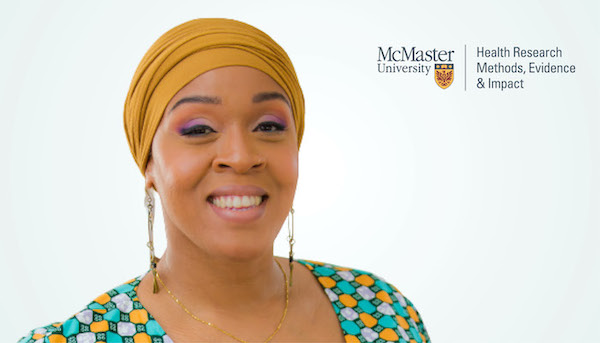Improving access to mental health services for Black communities: A Q&A with Dr. Fatimah Jackson-Best

Dr. Fatimah Jackson-Best, assistant professor with the Department of Health Research Methods, Evidence, and Impact (HEI), discusses her research that seeks to improve access to mental health and addictions services for Black communities across Ontario.
As one of the newest faculty members with HEI, tell us a bit about yourself.
I often call myself a health researcher who is also an anthropologist. I did my undergraduate and Masters degrees in social anthropology with a concentration on medical anthropology. My PhD was done at the Dalla Lana School of Public Health at the University of Toronto. I spent five years during my PhD living and working in Barbados, while also conducting my dissertation research on maternal depression amongst Black women on the island.
Since 2018, I have been working with the Black Health Alliance as the Project Manager of Pathways to Care. This is a systems change project which seeks to improve access to mental health and addictions services for Black children, youth and their families in Ontario. Over the last three and a half years, my team and I have been conducting community-based research, engaging with Black communities across the province, and developing knowledge products that highlight the mental health and addictions needs, barriers and facilitators to care for Black youth.
Describe your research program. What makes this work meaningful to you?
My short-term research goals are to complete the design of Pathways to Care’s research-informed interventions and implement and evaluate them to fulfill our project goal of improving access to mental health and addictions services for Black children, youth and families in Ontario.
My medium-term research aspirations focus on addressing the intersection of infectious disease and mental health. I aim to use community-based participatory research approaches and interventions to hone in on the COVID-19 pandemic and its impact on the mental health and wellbeing of Black communities in Canada.
My long-term research goals are to advance a large-scale, collaborative study on the phenomenon and prevalence of mental illness and stigma in Black communities in Canada.
This work is meaningful to me because I am a member of the Black community, and mental health-related topics are timely and urgent.
What drew you to McMaster University and made you eager to accept a position here?
McMaster is known for its research and teaching excellence. But what also attracted me to the University was its Black Faculty Cohort Hire initiative. McMaster was the first Canadian University that I saw engaging in such an important endeavour, and considering the systemic lack of Black faculty across the country, I thought it was a step in the right direction.
Additionally, the Department of Health Research Methods, Evidence, and Impact is full of brilliant minds, and I knew it would be a nurturing environment for the next steps in my career, which include my work with Black Health Alliance on the Pathways to Care project.
What do you hope to accomplish, as an educator and as a researcher, over the next few years?
I hope to do some excellent research and teaching, connect with graduate students, and move my program of research forward. My work with Pathways to Care will conclude in March 2023, but our knowledge products will remain and I hope they will enable Black communities to access mental health and addictions supports for young people in their lives.
Favourite piece of advice from a mentor or inspiring figure in your life?
“Remain grounded enough to know who you are, but flexible enough to adjust to whatever life puts in your path.”
Never has that advice been more pertinent than during Pathways to Care’s data collection phase, which started the very same week the COVID-19 pandemic shut much of the world down. My team had to pivot quickly and shift all of our activities online, including recruitment, focus groups and consultations. But quick thinking and patience paid off, and we were able to complete our qualitative and quantitative data collection within a reasonable timeframe.
Category, Researcher Profile